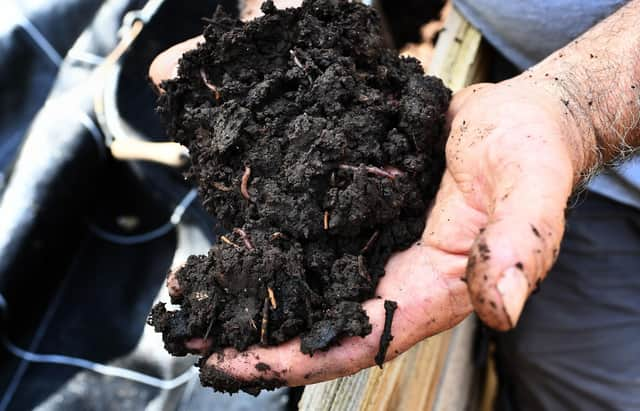The super-heroes of soil: Why the world under our feet matters and why it is under threat – Philip Lymbery


How many of us stop to think of the subterranean marvel below us, when we sit on the grass, go for a run or walk in a park? It’s hidden from view and often ignored, yet is fundamental to our survival.
A handful of healthy soil harbours more living organisms than the number of people on the planet. It is home to millions of super-heroes, from microorganisms and insects to intricate networks of mycelium that nourish everything around it.
Advertisement
Hide AdAdvertisement
Hide AdHealthy soil also depends on this vibrant range of lifeforms, including bacteria, fungi, earthworms and moles. These organisms represent around a quarter of all biodiversity on Earth, yet they receive little attention.
This humble brown matter also grows the world’s food: everything from the vegetables on our dinner plates to the seeds, leaves and blades of grass that animals eat in pasture-rich meadows. Without it, we would struggle to exist.
Silent soil
Only this spring I watched a field being ploughed, only to discover that the soil had no worms. The local gulls that follow ploughs came to the same conclusion and quickly flew off.
I stared down at the earth that had just been ploughed, but there was no sign of anything moving. There were no worms or insects desperate to get back into burrows, their worlds having been suddenly turned upside down.
Soft, sandy soil was all there was, thrown into gentle ridges. Then came the chemicals, spraying weeds away and insects too that would otherwise feed hungry wildlife with their seeds and larvae. It had become a barren wasteland.
You might be asking yourself why that matters?
The answer is this: without the life forms wriggling, crawling and surging through it, providing the network that holds it together, aerating and nourishing it, soil becomes nothing more than dirt – and dirt diminishes life.
Healthy soil is much more than just dirt – it is a living, breathing ecosystem. Up to four million worms can be found in a hectare of fertile land, potentially weighing more than the farmed animals above ground.
Soil not only holds a richness of life that would give any rainforest a run for its money, it also stores carbon from the atmosphere, soaks up water and recycles nutrients, thereby holding planetary life together.
Advertisement
Hide AdAdvertisement
Hide AdSadly, the wormless field I saw this spring is not a one-off; despite the crucial importance of soil to our survival, it is being depleted the world over, not least thanks to industrial agriculture.
Destructive force
Factory farms – those that rear chickens, pigs and cows en masse in intensive settings, cause significant destruction to the environment, thanks in part to huge concentrations of animal waste that pollute the earth around these farms.
By removing animals from their natural environments and keeping them indoors or in cages, they are also unable to graze, nuzzle and fertilise the soil.
And what about the food we give those animals to eat? Animal feed used in intensive factory farming – like cereals, soybeans or palm kernel – is often grown by clearing huge swathes of land that rip up extensive root networks and subterranean ecosystems, and with chemicals and pesticides that degrade the soil.
With little life left behind, the soil becomes dirt, and the dirt gets washed away by rains, and blown away by winds. It is a cycle that is beyond unsustainable.
The problem has become so severe that the United Nations has warned, carry on as we are and soils worldwide could be rendered useless within 60 years’ time.
Restoring soil health
The good news is that pioneering farmers around the world are returning to regenerative farming practices which restore soil health and bring back wildlife while giving farm animals lives worth living.
These systems are not only good for today, but also help ensure a sustainable way of feeding our planet for generations to come.
Advertisement
Hide AdAdvertisement
Hide AdOne of these farming pioneers is Tim May, who changed the way he farmed his 2,500 acres of land in Hampshire, England, after realising that chemicals were destroying his soil, and putting his livelihood at risk.
Now, Tim uses a regenerative system that allows his cows to graze over some parts of land, while other parts recover. Instead of harmful chemicals, he uses natural farming methods that allow worms, insects and organisms to flourish underground, and create pathways for the roots of crops to grow healthily.
In doing so, other forms of wildlife have returned to the farm, helping to naturally fertilise the soil and keep the balance of life in check. And so the cycle continues.
We can learn a lot from farmers like Tim. By using regenerative, agroecological farming – in harmony with nature, together with the technological innovations – we can save our soil so that it can produce the food we need to survive.
We need to start to think of our soil as a living thing. From microorganisms to insects and from worms to bacteria, we must recognise the vital role they play in our lives.
Next time you sit on the grass or walk across a field, spare a thought for the unsung heroes and complex food web that is busy at work beneath you, quietly underpinning our food today, and the future of us all.
Philip Lymbery is global chief executive of Compassion in World Farming International and a United Nations Food Systems Champion. He is on Twitter @philip_ciwf
A message from the Editor:
Thank you for reading this article. We're more reliant on your support than ever as the shift in consumer habits brought about by coronavirus impacts our advertisers.
If you haven't already, please consider supporting our trusted, fact-checked journalism by taking out a digital subscription.
Comments
Want to join the conversation? Please or to comment on this article.

